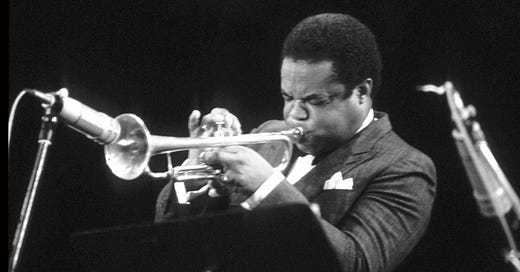Freddie Hubbard: A masterful blend of technical precision and soulful expression
Art Blakey and the Jazz Messengers featuring Jaki Byard
Freddie Hubbard played with Art Blakey’s Jazz Messengers from 1961 - 1966. In August of ‘61, Hubbard recorded Ready for Freddie (Blue Note), which was also his first collaboration with saxophonist Wayne Shorter. Hubbard then became Shorter's bandmate when he replaced Lee Morgan in Art Blakey's Jazz Messengers later in 1961.[3] He played on more than 10 live and studio recordings with Blakey during one of the most acclaimed eras of the Jazz Messengers, including Caravan, Ugetsu, Mosaic, and Free for All. In all, during the 1960s, he recorded eight studio albums as a bandleader for Blue Note, and more than two dozen as a sideman.[5] Hubbard remained with Blakey until 1966, leaving to form the first of several small groups of his own, which featured, among others, his Blue note associate James Spaulding, pianist Kenny Barron and drummer Louis Hayes
Freddie Hubbard's trumpet playing holds a significant place in jazz history due to several key reasons.
Hubbard was renowned for his exceptional technical skill. He had a remarkable command over the trumpet, which allowed him to play with both high speed and accuracy. His ability to play complex, fast passages cleanly and with ease set a new standard for technical proficiency in jazz trumpet playing.
Freddie's playing was not just technically proficient, but also deeply expressive. He had a unique tone that was both powerful and lyrical, and he was able to convey a wide range of emotions through his instrument. His style was versatile, enabling him to excel in various jazz genres, from hard bop to fusion.
Hubbard was one of the key figures in the development of hard bop and post-bop styles. His work with Art Blakey's Jazz Messengers and his own albums as a leader contributed significantly to the evolution of these genres. He was able to blend complex harmonies and rhythms with soulful, blues-influenced playing. And because of this, Freddie Hubbard influenced a whole generation of trumpet players who followed him. His approach to the instrument and to jazz improvisation can be heard in the playing of many contemporary jazz musicians.
In ‘65, Blakey and the Messengers played a gig in Paris, with the great Jaki Byard on piano. Here’s Crisis, Hubbard’s composition.





